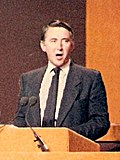Reaction
This defeat was seen as a huge setback for the Conservatives, coming on top of their defeat in the general election the previous year and wiping out the boost they had received in the 1965 Leyton by-election. Douglas-Home resigned as leader shortly afterwards, and in the first election for party leader from amongst the Conservative MPs, was replaced by Edward Heath.
After his victory, Steel said that Douglas-Home was the only leading figure in the Conservatives who could "take some comfort from the result" as he was the only one not to have come to the constituency to campaign in the by-election. The defeated Conservative candidate McEwen blamed his defeat on Labour voters switching to back the Liberals and predicted that the Liberal victory would be overturned at the next general election. In contrast Liberal MP for Caithness and Sutherland George Mackie described the result as "a triumph for David Steel" which showed that the "Liberal surge in Scotland" was continuing and predicted that the next general election would see the party make further gains in Scotland. [2]
Although the Labour candidate lost his deposit, the governing party enjoyed the Conservatives' discomfort, and the result represented a turning point in the government's political fortunes after a very uncertain opening few months. For the Liberals, the acquisition of a talented young MP was still rare enough to be extremely welcome. Steel soon made a national impression and it was his Private Member's Bill which led to the legalisation of abortion in 1967. He would continue to represent the area at Westminster until 1997.
This page is based on this
Wikipedia article Text is available under the
CC BY-SA 4.0 license; additional terms may apply.
Images, videos and audio are available under their respective licenses.
